Almost 2,500 Sign Petition Protesting Possible Theater Cuts at St. Ambrose
Less than a week after it was posted on Change.org, roughly 2,500 people have a signed a petition protesting potential removal of the theater major at St. Ambrose University, Davenport.
The petition to the Board of Trustees says that due to economic concerns, the private SAU is considering eliminating the theater major and converting it to a minor. “Removing the theatre major will rob many students of opportunities to take classes that will help them to develop and hone essential skills within and outside of the theatre world,” says the page, started Aug. 28 by SAU student Erika Seabloom.

St. Ambrose performed the musical “Cabaret” in spring 2018.
Ambrose has produced many successful theater alumni, including Emmy-award winning Brian Hemesath, who has designed costumes for shows on and off-Broadway, as well as TV’s “Saturday Night Live” and “Sesame Street.” In late July, the 48-year-old Iowa native won his third Daytime Emmy Award for his work on “Sesame Street.” Hemesath — who earned his bachelor’s in theater and art in 1994 from SAU — has a total of eight Emmy nominations.
“Without the theatre major, Brian would not have attended St. Ambrose,” the online petition says. “Even if he had attended as a theatre minor, based off the current requirements, he would not have been required to take Introduction to Design. It may not have even been offered.”
Getting rid of the major is not only a detriment to those interested in majoring in theater, Seabloom wrote. SAU is “a liberal arts college that prides itself on providing a well-rounded education to its students. Because of this, St. Ambrose requires all students to take at least one Creative Arts course,” the petition says.
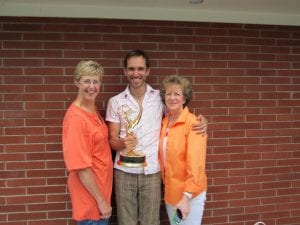
SAU 1994 alum Brian Hemesath shows off his Emmy with Cory Johnson and Dianne Dye.
“It does not necessarily have to be in theatre, but many students choose to take their required class in theatre. Removing the major and reducing the number of classes offered therefore impacts any student interested in taking a theatre course, regardless of major. Research has shown that there are many benefits to studying, observing, and participating in theatre.”
“Being involved in theatre has been proven to improve academic performance in other subjects, such as math and science,” the petition says. “It teaches valuable teamwork and communication skills not found in other classes. Theatre opens student’s eyes to experiences other than their own, helping them to be more empathetic and understanding of others. This is something that is essential to the success of all individuals, no matter what their career path might be. It is what helps us grow as a society.”
Dozens of people have posted their agreement and personal stories to the site.
“Theatre has been a part of my journey throughout life,” Justin Brasher posted. “It has brought me to some of my brightest moments, and rescued me from some of my darkest. Without theatre, there are no movies, no tv shows, no live productions. No Witcher, no Star Wars, no Hamilton.

Sam Jones starred as the MC in “Cabaret at SAU.
“Theatre is part of my everyday life. Improv skills keep me quick on my feet in customer service,” he wrote. “Learning to project helps me communicate with a large room. Performing a role in front of 500 people makes a presentation in front of 50 people easy. Stepping into the shoes of other characters has taught me to be more empathetic.
“In short, theater has made me a better worker, a better communicator, and a better person,” Brasher said.
“There is nothing like it. For some, it’s the place they call home,” SAU student Hannah Mendenhall posted. “For others, it’s where they feel they can be their most authentic self. Taking away that major shuts the door on so many people’s dreams.”
Alyssa Oltmanns, theatre director at Muscatine Community College and a Q-C native, posted: “It is a gem that the area is fortunate to have. Award-winning as well as locally beloved, many students of mine (and many who I happen to just know) have gone on to study at SAU. The school would be blind to rob the area of such a pillar, and it is unconscionable.”
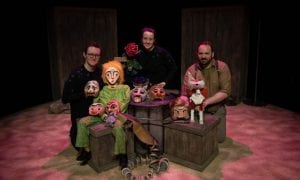
Co-creators of “The Little Prince” included SAU alums Dan Rairdin-Hale, left, Amelia Fischer and Aaron Randolph III.
“The artistic experiences I had both on the stage and behind the curtain gave me the versatility to become not only a professional actress, but a director and a producer as well,” Ambrose alum Kim Kurtenbach wrote on Facebook. “The faculty in the theater department are some of the most creative, talented and skilled artists and educators I know.”
“They were more than teachers… they became friends and family to me,” she wrote. “I am one of many alumni who have gone on to build a successful career in the industry. This institution holds a special place in my heart and I do not wish to see it disappear the way so many arts and theatre programs are during this challenging time.”
SAU provost and vice president Paul Koch on Thursday would not comment on the department plans, saying: “St. Ambrose University regularly evaluates academic programs based on student outcomes, enrollment, and sustainability. These evaluations include input from faculty governance committees. We cannot discuss decisions that have yet to be made nor can we share a timetable for making such decisions given their complexity.

Erika Seabloom started the online petition on Aug. 28.
“As with all impactful decisions, we will weigh available evidence and input from the campus, including students, in order to make the best possible choices for the future of the university and its students,” he said.
The petition adds one of the amazing things about SAU “is the interdisciplinary participation we have, especially in the arts. People come here because they are able to be a part of band, choir, and theatre even if they aren’t majors. This is an indirect economic benefit that would be lost if the theatre department is cut.
“Then there is the unbelievable impact this major and department have had on all of us who are a part of it,” it says. “Through our work together in classes, on-stage, and behind the scenes, we have all grown into a unique community and, I dare say, a family. Our major may be small, but that is what makes us strong and marketable within our careers. We have the opportunity at St. Ambrose to learn all forms of theatre, rather than focusing on only one aspect such as acting, which is commonplace at other larger institutions.
“Thanks to St. Ambrose’s theatre major, we have all learned or will soon learn about set construction, design, acting, stage management, and directing. We have become equipped with a diverse set of skills that make our resumes stand out from others,” the petition says.
SAU’s theater department fact sheet says: “Our program is a small, but a very active and accomplished one. We offer a major and a minor in
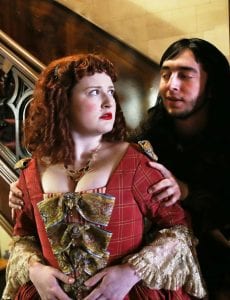
Moliere’s “Tartuffe” at Ambrose in 2019 featured Sarah Goodall and Tyler Hughes.
theatre that include such courses as: Basic and Advanced Acting, Scenic, Light and Costume Design, Script Analysis, Dramatic Literature, Theatre History, Music Theatre, Theatre in London, Survey of Theatre, and Directing.”
The school has fared extraordinarily well in its experiences with the Kennedy Center American College Theater Festival. SAU has garnered several KCACTF Certificate of Merit awards for directing, scenic design, lighting design, costume design, stage management and ensemble acting. Many SAU students have been selected by visiting adjudicators to compete in the Irene Ryan Acting competition – at least 15 students have advanced to the Ryan semi-final round, and nine have advanced to the final round.
In 2003, SAU’s Dan Rairdin-Hale (now the department chair) and in 2005 Daniel Sheridan won the regional acting competition and went on to be one of 16 undergraduates and graduates nationwide to compete at the Kennedy Center in Washington, D.C.

SAU theater professor Cory Johnson.
In 2005, theater professor Cory Johnson was named Acting Coach of the Year for KC/ACTF Region V. She also acted as regional coordinator of the Irene Ryan Acting Auditions from 2010 to 2013.
In 2009, SAU theatre major Rachel Mayer won the regional student directing title and was invited to spend a week at the Kennedy Center studying directing with renowned professionals. In 2010, alumna Sarah Ulloa won the first prize in Musical Theatre Performance and senior Dan Hernandez won the title of Best Scene Partner.
Johnson in 2017 received a pinnacle honor of her profession, The Kennedy Center Medallion from the college festival. Each year, the eight KCACTF regions honor individuals or organizations that have made extraordinary contributions to teaching and producing theater, and who have “significantly dedicated their time, artistry and enthusiasm to the development” of the festival, according to the prize summary.
“Most importantly, recipients have demonstrated a strong commitment to the values and goals of KCACTF and to excellence in educational theater,” it says, noting the gold medallion is the most prestigious regional award given by KCACTF and is considered one of the great honors in theater education.
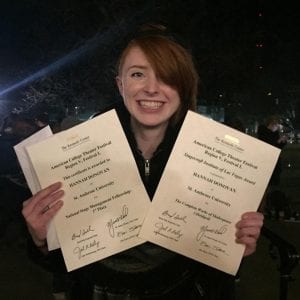
Hannah Donovan in 2018 with her Kennedy Center theater festival awards.
Region 5 encompasses seven Midwest states, and each regional festival chooses a student actor, director and stage manager to attend the weeklong national festival in April, in Washington, D.C.
In 2018, senior Hannah Donovan won first place in the stage-management competition at Region 5, and spent a week that April at the Kennedy Center.
Earlier this year, three members of SAU’s “The Little Prince” production were honored with national festival awards. Joseph Lasher and Jeremy Mahr won Distinguished Performance by an Actor, and Aaron Hook was recognized with Distinguished Lighting Design.
They were among more than 120 students selected to travel to Washington, D.C. for an all-expenses paid trip to participate in National Festival events at the Kennedy Center, April 6–10, but the 2020 Festival was unfortunately canceled due to the Covid-19 pandemic.
Last year, Rairdin-Hale adapted the French children’s story, “The Little Prince,” with help from fellow SAU alumni, including playwright and composer Aaron Randolph III ’02, ’10, actress Amelia Fischer ’16, and SAU scene shop technician Zachary Lawson ’18. It was also performed by QC Theatre Workshop in Davenport, and in Coralville and Chicago.
Lescinski to retire in August 2021
After 13 years of leading St. Ambrose, Sister Joan Lescinski recently announced she will retire as president effective August of 2021.
A national search for the 14th president in the university’s 138-year history will begin shortly. Trustee alumni John Anderson ’87 and Renee Citera ’81 have been appointed to co-chair a Presidential Search Committee by the Most Rev. Thomas Zinkula, Bishop of the Diocese of Davenport and Chair of the SAU Board of Trustees.
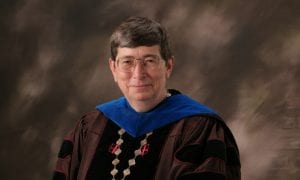
SAU president Sister Joan Lescinski will retire next year.
The Presidential Search Committee will consist of six additional members of the Board of Trustees and seven representatives from among the University’s faculty, staff, students and alumni.
WittKieffer, a global executive search firm, has been chosen to assist in the search, which is expected to conclude by February 2021. WittKieffer also assisted in the selection of Sister Joan to succeed Edward Rogalski as St. Ambrose president in 2007.
Upon retirement, Sister Joan will conclude nearly a half-century of service to Catholic higher education, including 14 years as president of St. Ambrose. Under her leadership, SAU has experienced significant growth in its curriculum and major expansion of its academic, residential and athletics facilities.
Since 2007, St. Ambrose has added a Master of Physician Assistant Studies program, which debuted as the third such program in Iowa in 2014, and a Bachelor of Arts in Business and Healthcare Sales degree program, which debuted in 2016 as the state’s first business degree program focused solely on sales.
Other graduate program additions include the Master of Speech-Language Pathology, the Master of Science in Exercise Physiology, and the Master of Public Health. The university also added a third doctoral program when the Doctor of Occupational Therapy program was accredited in 2016, completing its conversion from a master’s program. Pace-setting undergraduate programs such as Sales, Biomedical Laboratory Science and Cybersecurity are among several new bachelor degree offerings added under Sister Joan’s leadership.
Also, since 2007, SAU has added 11 varsity athletics programs, and enhanced facilities for athletes and fitness-minded students. At a total cost of $21.5 million, the 80,000-square-feet Wellness and Recreation Center was the largest capital project in university history and opened in August 2017. The university also partnered with Assumption High School in 2016 to introduce the St. Vincent’s Athletics Complex, a multi-phase project that includes a softball complex, a football locker and office facility, and multi-use fields for soccer, football, and lacrosse. A second phase of the project is nearing completion, with a competition football field and an outdoor track and field facility.
Last month, the university completed an $8.6 million renovation and expansion of McMullen Hall to create a fully digital, state-of-the-art home for the College of Business. Since 2007, the university also has grown its endowment from $40 million to $170 million.




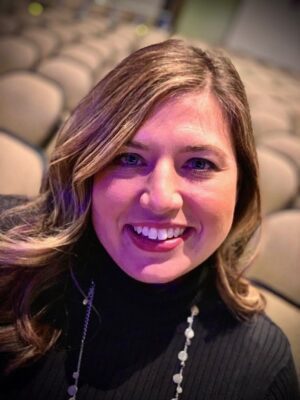
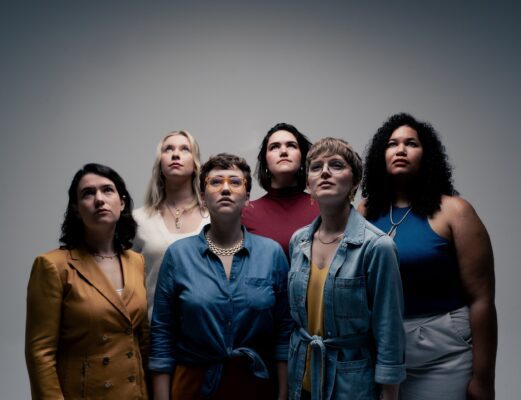







Leave a Reply
You must be logged in to post a comment.